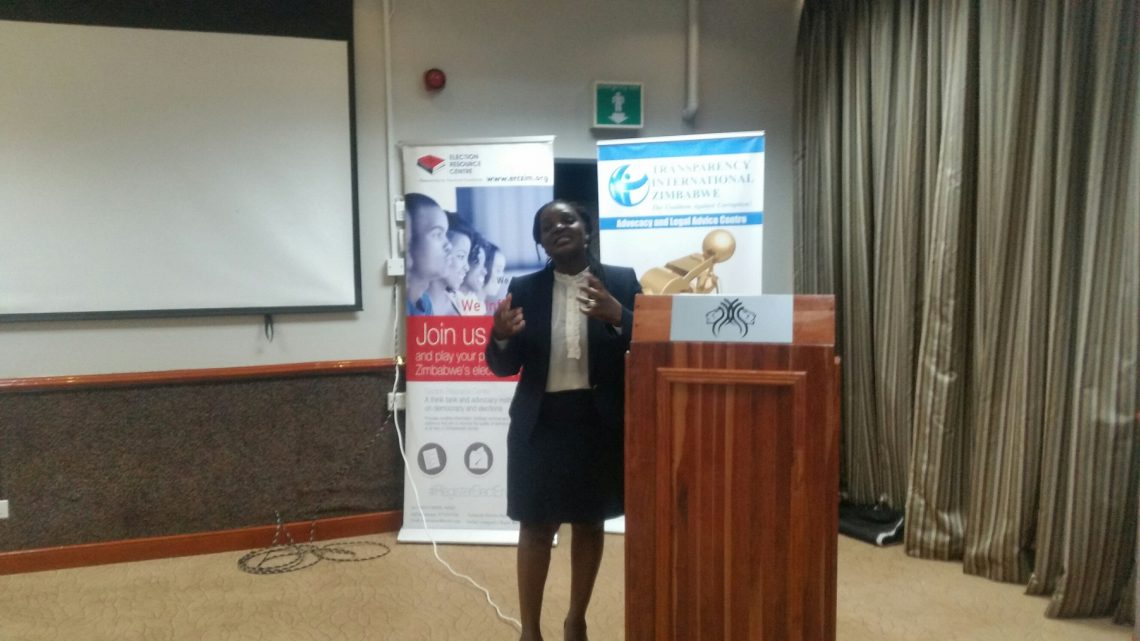By Byron Mutingwende
The financing of political parties is becoming a bone of contention as Zimbabwe slowly trudges towards the harmonised elections on 30 July 2018.
Speaking at the meeting to discuss the matter on 21 June 2018, Frank Mpahlo, the Transparency International Zimbabwe (TIZ) Programme Officer said in view of the financial allocation made to political parties by the Treasury in accordance with provisions of the Political Parties Finance Act Chapter 2:11, it was imperative to interrogate the policies, institutional structures and public perception on the transparent use of these resources.
“Given the inconsistencies surrounding the financing of political parties in Zimbabwe during this current electoral period, TIZ and the Election Resource Centre (ERC) acknowledges that political finance will remain a challenge in Zimbabwe where the legal framework for political finance is weak. This, we believe is also exacerbated by the secrecy surrounding the lack of information on financing of political parties in Zimbabwe.
“It is our view that monitoring the use and abuse of state and other resources becomes important in looking out for potential sources of corruption and introducing measures to combat political finance corruption through legal reform to ensure greater transparency in political finance,” Mpahlo said.
Barbra Nyangairi, an independent political and social analyst said the financing of political parties is generally considered to be one of the critical factors for the success of multiparty democracy and pointed out that the Political Parties Finance Act has not been amended since 2004.
In Africa, there is widespread perception in some societies that the ruling party uses State funds to support its activities, to the disadvantage of opposition parties which do not have access to such resources.
“The reality that many African societies lack a strong private economy means that opposition political parties cannot rely on contributions from wealthy supporters to make up for any resource advantage which the ruling party may have,” Nyangairi said.
That assertion was corroborated by Jacob Mafume, a spokesperson of the People’s Democratic Party that is a member of the MDC Alliance who said the ruling party enjoyed unfettered access to state resources.
“It’s difficult to campaign against the ruling party Zanu (PF) whose president is both the head of state and government. All the ministers are from his party. In that regard, they can easily use state resources to campaign for Zanu (PF) under the guise of entrenching state programmes. The President and his entourage also uses helicopters to traverse the country when campaigning therefore they have an added advantage when it comes to access of state resources,” Mafume said.
He said that naturally democracy is expensive, which makes state funding critical for all political parties in countries with fragile democracies where the governing party has inexhaustible access to state resources that it routinely abused to bolster its party activities and to campaign in elections against enfeebled opposition parties.
Mafume went further to assert that the ruling party enjoyed free advertisement in state media when state owned enterprises pay for advertising space even when the President or his immediate family members have birthday parties.
Nyangairi agreed and said such a situation affects the democratic content and quality of elections but warned that caution has to exercised for briefcase parties seeking state funding since if they were given access, many would form fly by night political parties.
Tafadzwa Mugwadi of Zanu PF dismissed the notion that his party relied on the use of public funding for campaigning.
“As Zanu PF we are the biggest political party in the country with a national representation capable of fielding candidates in all the posts. Already we have over 90 seats in council because other political parties failed to field candidates.
“We raise our funds from private sources such as membership fees, subscriptions and contributions and dues. Our membership fee is $3 per person and we have been innovative to make our party card work in the same manner as a debit card. Recently, I shocked shopkeepers in a retail outlet when I used my Zanu PF membership card to buy myself lunch,” Mugwadi said.
Internal soucing of political financing is possible since in some instances, members of parliament of the party may be levied a certain percentage of their government salary while ordinary members pay a stipulated monthly or annual subscription while there may be donations by individuals or corporations (in cash or kind) and some fund raising activities like the sale of party regalia. Other political parties may engage in economic activities like establishing party newspaper/s, investing in property, or forming profit making companies and giving out loans.
However, Nyangairi pointed out that the current threshold for accessing public funding in Zimbabwe only benefits the MDC and ZANU (PF) and excludes smaller political parties.
“To survive, and perhaps even to grow, these small political parties will have to look elsewhere, within the confines of the law, for funding. It is believed that they have had to resort to ‘overt and covert methods of funding’ their activities. Even the recipients of public funding themselves have to fund raise privately to supplement what they receive from the State, and this might include raising funds beyond the limits of the law.,” Nyangairi added.
As recommendation, she said political parties must be required to present to an independent electoral commission and subject to oversight by Parliament, annual audited accounts in respect of funds received from the State.
“The funds should be audited by an international firm of Chartered Accountants or by a local reputable, independent and impartial firm approved by the independent electoral commission.The audited accounts must also be available for public inspection. The Political Parties (Finance) Act empowers the Minister of Justice to prescribe regulations, inter alia, the keeping by political parties of proper books of accounts, the audit of the accounts of political parties, and the form, content and publication of statements of accounts by political parties. The Minister of Justice has however not done so.”
